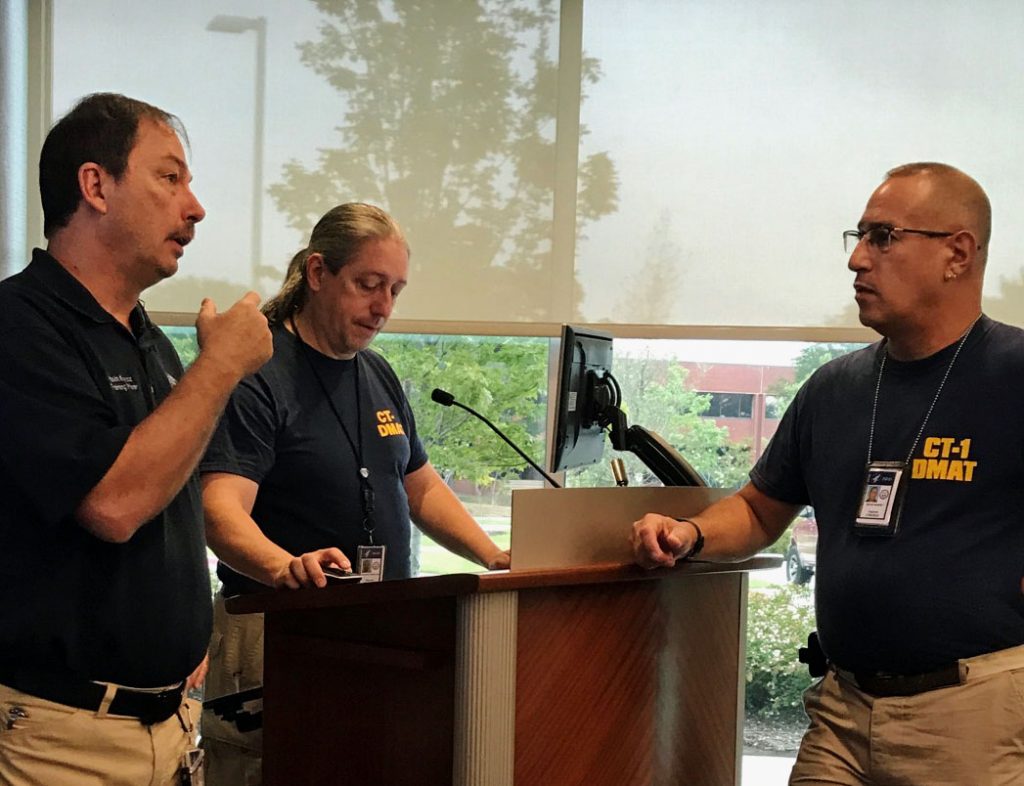ECSU Emergency Management Faculty Offer Hurricane Prep Tips

ECSU emergency management professor Kevin Kupietz, left, talks to emergency management team members during the aftermath of Hurricane Harvey in Houston, Texas last year. Kupietz is a member of a national disaster relief team.
As a member of the ECSU Emergency Management Faculty we would be remiss if we did not send out a word of caution for the upcoming storm. It is always important that individuals, families, organizations and communities are prepared for emergencies/disasters.
North Carolina is currently looking at greeting Hurricane Florence at the end of this week. The Governor has issued a state of Emergency for North Carolina this past Saturday and the State Emergency Operations Center opened on Monday to start coordinating the assets and supplies needed to respond and recover from such a storm. Projections are still not certain as to the direct impact or even the force but communities are being warned to expect hurricane force winds, large amounts of rainfall resulting in strong potential for flooding and power outages.
September kicks off the FEMA disaster preparedness month celebrations, so the question to you then is, Are you prepared? FEMA’s website at Ready.gov gives several recommendations for preparedness such as the amount of bottled water you should store at home. The recommendation is 1 gallon of water per person per day.
Ideally a home should be prepared to be self-sustainable for at least 72 hours. Is there food such as canned products that will sustain the family? If it is canned food is there a manual can opener available? Seems like a no brainer but this is a common problem as society has become reliant on electricity and the convenience it brings.
Is the automobile fueled up prior to the storm. A family should have access to cash in case ATMs do not have power and the banks are not able to open. Generators are nice to have to provide some electricity including keeping the food in the fridge and freezer from expiring. If power is not maintained to the refrigerator and freezer watch the food to ensure that only safe food is consumed. Cold food will remain colder longer by maintaining the door of the appliance closed as much as possible. If the quality of the food is suspect, do not risk the illness.
Have you got a plan for your pets and evacuation if it comes to that? For more safety ideas see the below recommendations from https://www.ready.gov/hurricanes. Remember to be safe and help to educate others to prepare and be safe. If you would like to know more about learning how to be prepared and help others to be prepared come join our Campus CERT group meeting on Tuesday, Sept. 11 in room 303 of the Gilchrist building. If you have questions feel free to contact Kevin Kupietz at kdkupietz@ecsu.edu
The Following are additional tips to help you through the storm:
IF YOU ARE UNDER A HURRICANE WARNING, FIND SAFE SHELTER RIGHT AWAY
- Determine how best to protect yourself from high winds and flooding.
- Evacuate if told to do so.
- Take refuge in a designated storm shelter, or an interior room for high winds.
- Listen for emergency information and alerts.
- Only use generators outdoors and away from windows.
- Turn Around, Don’t Drown! Do not walk, swim, or drive through flood waters.
Prepare NOW
- Know your area’s risk of hurricanes.
- Sign up for your community’s warning system. The Emergency Alert System (EAS) and National Oceanic and Atmospheric Administration (NOAA) Weather Radio also provide emergency alerts.
- If you are at risk for flash flooding, watch for warning signs such as heavy rain.
- Practice going to a safe shelter for high winds, such as a FEMA safe room or ICC 500 storm shelter. The next best protection is a small, interior, windowless room in a sturdy building on the lowest level that is not subject to flooding.
- Based on your location and community plans, make your own plans for evacuation or sheltering in place.
- Become familiar with your evacuation zone, the evacuation route, and shelter locations.
- Gather needed supplies for at least three days. Keep in mind each person’s specific needs, including medication. Don’t forget the needs of pets.
- Keep important documents in a safe place or create password-protected digital copies.
- Protect your property. Declutter drains and gutters. Install check valves in plumbing to prevent backups. Consider hurricane shutters. Review insurance policies.
When a hurricane is 36 hours from arriving
- Turn on your TV or radio in order to get the latest weather updates and emergency instructions.
- Restock your emergency preparedness kit. Include food and water sufficient for at least three days, medications, a flashlight, batteries, cash, and first aid supplies.
- Plan how to communicate with family members if you lose power. For example, you can call, text, email or use social media. Remember that during disasters, sending text messages is usually reliable and faster than making phone calls because phone lines are often overloaded.
- Review your evacuation zone, evacuation route and shelter locations. Plan with your family. You may have to leave quickly so plan ahead.
- Keep your car in good working condition, and keep the gas tank full; stock your vehicle with emergency supplies and a change of clothes.
When a hurricane is 18-36 hours from arriving
- Bookmark your city or county website for quick access to storm updates and emergency instructions.
- Bring loose, lightweight objects inside that could become projectiles in high winds (e.g., patio furniture, garbage cans); anchor objects that would be unsafe to bring inside (e.g., propane tanks); and trim or remove trees close enough to fall on the building.
- Cover all of your home’s windows. Permanent storm shutters offer the best protection for windows. A second option is to board up windows with 5/8” exterior grade or marine plywood, cut to fit and ready to install.
When a hurricane is 6-18 hours from arriving
- Turn on your TV/radio, or check your city/county website every 30 minutes in order to get the latest weather updates and emergency instructions.
- Charge your cell phone now so you will have a full battery in case you lose power.
When a hurricane is 6 hours from arriving
- If you’re not in an area that is recommended for evacuation, plan to stay at home or where you are and let friends and family know where you are.
- Close storm shutters, and stay away from windows. Flying glass from broken windows could injure you.
- Turn your refrigerator or freezer to the coldest setting and open only when necessary. If you lose power, food will last longer. Keep a thermometer in the refrigerator to be able to check the food temperature when the power is restored.
- Turn on your TV/radio, or check your city/county website every 30 minutes in order to get the latest weather updates and emergency instructions.
Survive DURING
- If told to evacuate, do so immediately. Do not drive around barricades.
- If sheltering during high winds, go to a FEMA safe room, ICC 500 storm shelter, or a small, interior, windowless room or hallway on the lowest floor that is not subject to flooding.
- If trapped in a building by flooding, go to the highest level of the building. Do not climb into a closed attic. You may become trapped by rising flood water.
- Listen for current emergency information and instructions.
- Use a generator or other gasoline-powered machinery outdoors ONLY and away from windows.
- Do not walk, swim, or drive through flood waters. Turn Around. Don’t Drown! Just six inches of fast-moving water can knock you down, and one foot of moving water can sweep your vehicle away.
- Stay off of bridges over fast-moving water.
Be Safe AFTER
- Listen to authorities for information and special instructions.
- Be careful during clean-up. Wear protective clothing and work with someone else.
- Do not touch electrical equipment if it is wet or if you are standing in water. If it is safe to do so, turn off electricity at the main breaker or fuse box to prevent electric shock.
- Avoid wading in flood water, which can contain dangerous debris. Underground or downed power lines can also electrically charge the water.
- Save phone calls for emergencies. Phone systems are often down or busy after a disaster. Use text messages or social media to communicate with family and friends.
- Document any property damage with photographs. Contact your insurance company for assistance.
Kevin Kupietz is a member of the ECSU Emergency Management program faculty and a national disaster relief official.


